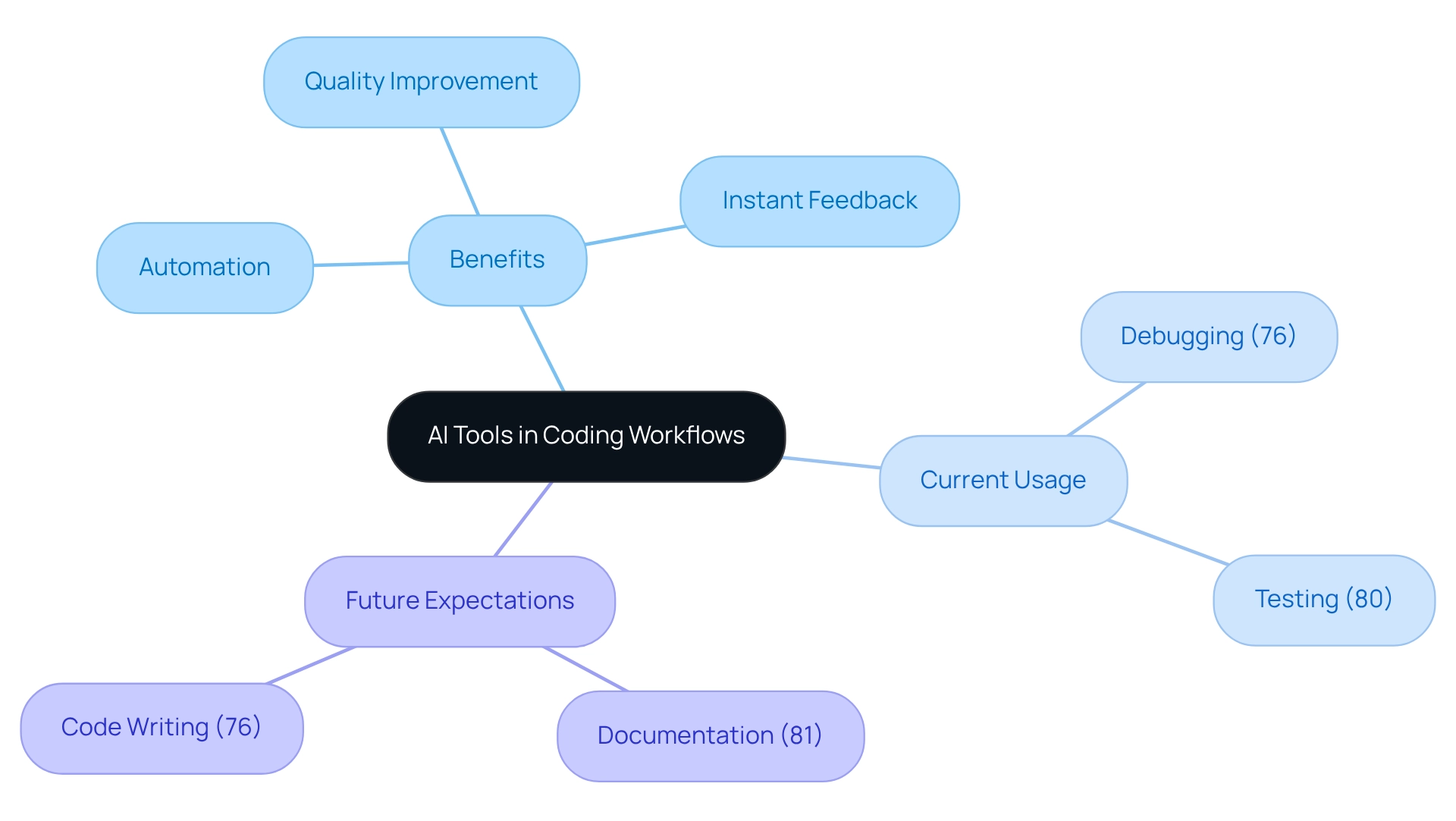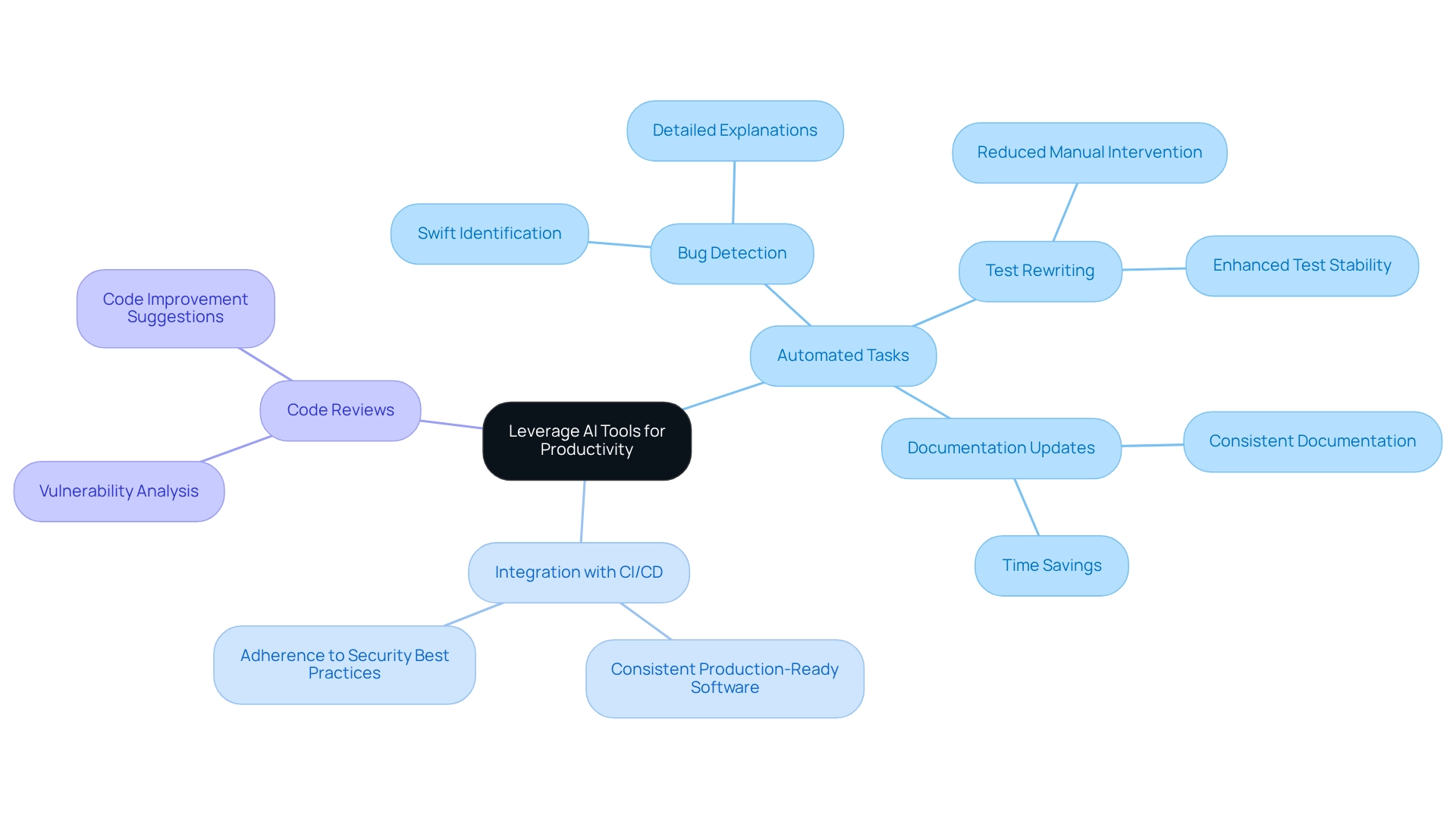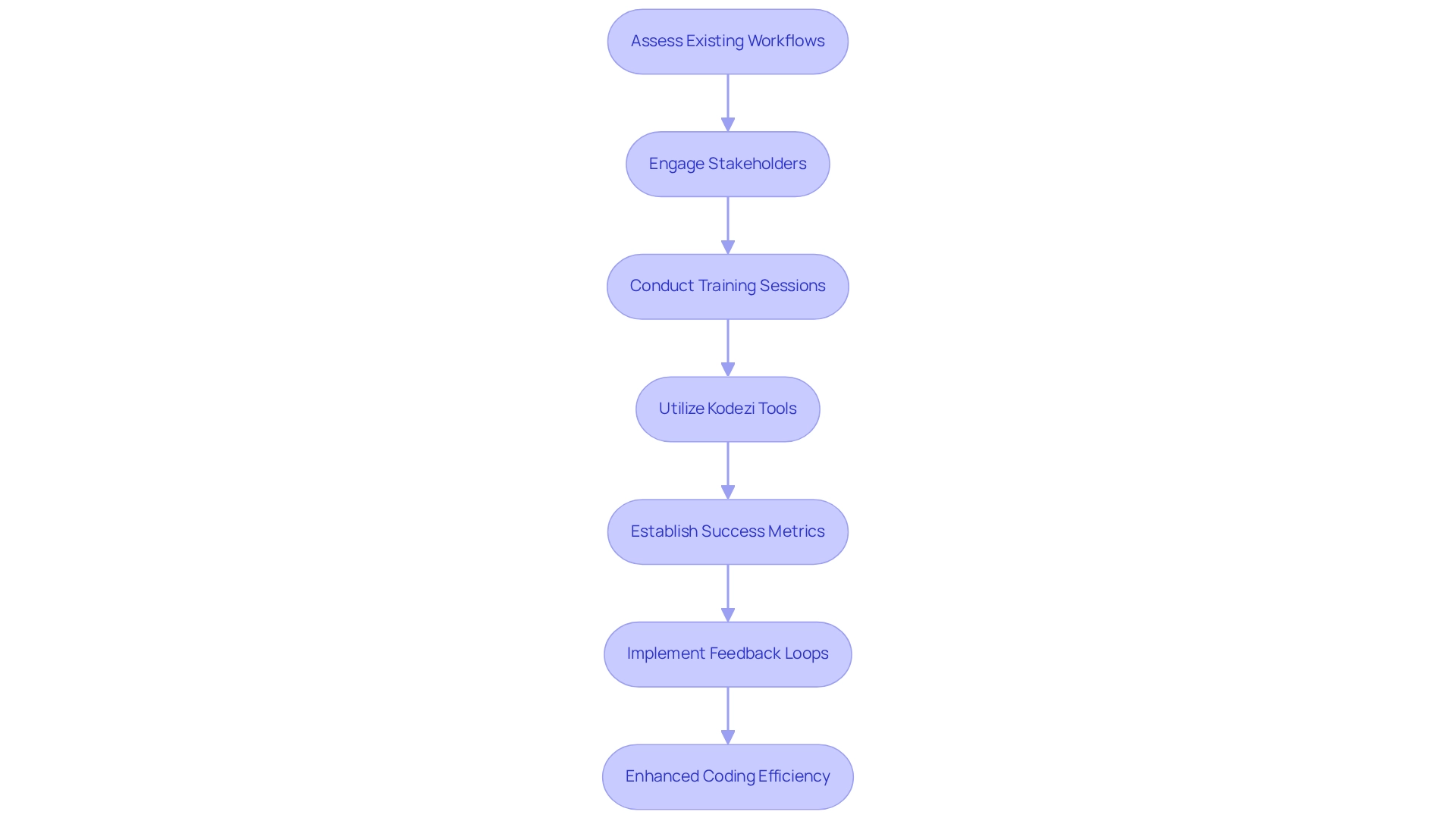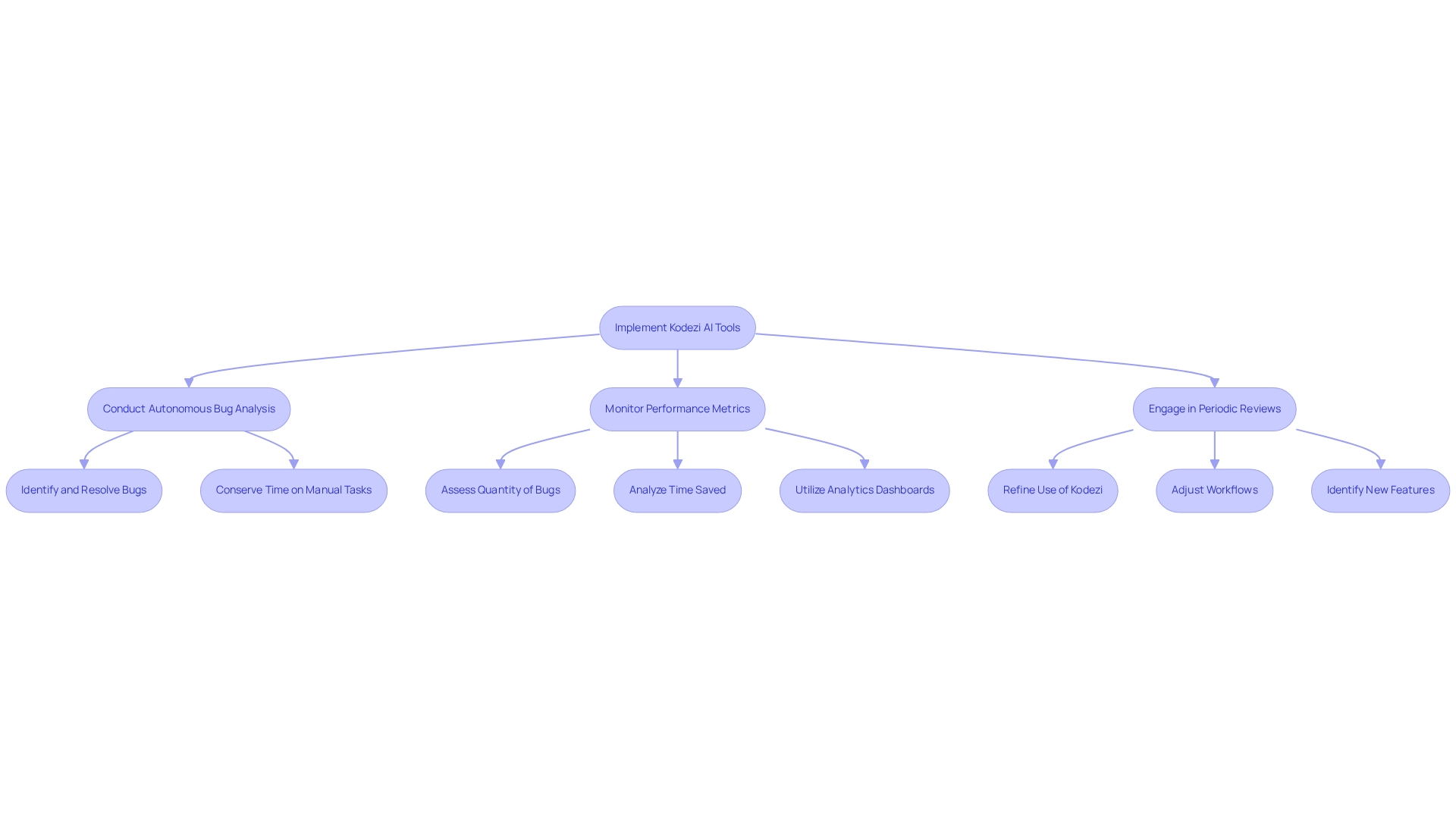Overview
Coding challenges are a common hurdle that developers face, often leading to inefficiencies and frustration. AI tools for coding, like Kodezi, effectively address these challenges by automating repetitive tasks such as debugging, performance optimization, and code documentation. By utilizing Kodezi, developers can enhance software quality and significantly boost productivity.
Imagine a scenario where your team spends less time on routine maintenance and more time on strategic initiatives. Kodezi transforms coding workflows by allowing developers to focus on what truly matters. This not only improves code quality but also fosters a more innovative and engaging work environment.
Furthermore, the benefits of using Kodezi extend beyond mere efficiency. Teams can achieve a remarkable increase in productivity, enabling them to deliver high-quality software faster and with fewer errors. With Kodezi, the coding process becomes streamlined, allowing developers to harness their creativity and expertise.
In addition, exploring the tools available on the Kodezi platform can revolutionize your coding practices. Are you ready to elevate your coding experience? Discover how Kodezi can empower you and your team to achieve new heights in software development.
Introduction
In the rapidly evolving landscape of software development, developers face numerous challenges that can hinder their productivity and creativity. How can they overcome these obstacles? The integration of artificial intelligence tools, such as Kodezi CLI, is transforming coding workflows in unprecedented ways. With the ability to automate mundane tasks, enhance code quality, and provide immediate feedback, Kodezi not only streamlines processes but also empowers developers to focus on innovation and strategic initiatives.
As the demand for efficiency grows, a significant majority of developers are embracing AI, anticipating its integration in critical areas such as documentation and testing. This shift signals a new era where AI is poised to redefine coding practices. Imagine achieving remarkable productivity gains while fostering a culture of continuous improvement. The benefits of using Kodezi are clear: improved productivity, enhanced code quality, and the freedom to innovate.
The journey towards leveraging these powerful tools effectively involves understanding their capabilities, implementing best practices, and continually optimizing their performance for long-term success. Are you ready to explore the tools available on the Kodezi platform? Discover how you can transform your coding workflow and elevate your development process.
Understand the Role of AI Tools in Coding Workflows
In today's fast-paced development landscape, coding challenges are a common hurdle for many developers. AI tools for coding are transforming contemporary programming processes by automating repetitive activities, improving software quality, and providing instant feedback. Kodezi addresses these challenges effectively, playing a crucial role in debugging, optimizing performance, and ensuring adherence to coding standards. By integrating AI resources like CLI applications, development teams can shift their focus from routine tasks to more strategic initiatives, significantly enhancing productivity and promoting innovation.
Furthermore, Kodezi CLI independently enhances software repositories and resolves issues prior to deployment. This enables developers to concentrate on feature development rather than maintenance. This shift not only improves efficiency but also fosters a culture of ongoing enhancement within engineering teams. Have you considered how much time could be saved by automating these processes with AI tools for coding?
Looking forward, a substantial number of developers expect AI resources to become more integrated into their workflows, especially in documentation (81%), testing (80%), and code writing (76%). This growing confidence in AI's role underscores its potential to enhance development processes and improve overall efficiency. Current statistics reveal that 76% of developers are already employing AI tools for coding, specifically for debugging and performance enhancement, reflecting a shift towards more effective coding practices. As we enter 2025, the influence of AI tools for coding, particularly Kodezi's automated offerings, on coding processes is anticipated to intensify. This evolution will further change how teams handle software development. Are you ready to explore the tools available on the Kodezi platform and elevate your coding practices?

Leverage AI Tools to Enhance Productivity and Efficiency
Coding challenges are a common hurdle for developers, often leading to increased frustration and inefficiency. To tackle these issues, teams can leverage AI tools that automate essential tasks such as bug detection, test rewriting, and documentation updates. Kodezi, for instance, features an automated debugging capability that swiftly identifies and resolves issues, providing detailed explanations of what went wrong and how it was corrected. This not only significantly reduces the time developers spend debugging but also enhances overall software quality.
Furthermore, integrating Kodezi with CI/CD pipelines simplifies the deployment process. This guarantees that software remains consistently production-ready while adhering to the latest security best practices. Have you considered how much smoother your deployment could be with such automation? Teams can also utilize AI tools for coding like Kodezi for code reviews, where the software analyzes code for potential vulnerabilities and suggests improvements, thereby maintaining cleaner codebases. By adopting these practices, groups can achieve higher throughput and elevate their programming efforts. Imagine the productivity gains and improved code quality that could result from using Kodezi. Explore the tools available on the platform and see how they can transform your coding experience.

Implement Best Practices for Seamless AI Tool Integration
In today's fast-paced coding environment, developers often encounter significant challenges that hinder their productivity and code quality. How can they effectively address these issues? Kodezi offers innovative solutions designed to streamline workflows and enhance coding efficiency. By assessing existing workflows, teams can pinpoint areas where automation, like Kodezi's capabilities, can deliver substantial benefits.
Engaging all stakeholders, from developers to project managers, is essential for fostering buy-in and addressing concerns during the transition. Training sessions are vital, as they equip team members with the knowledge and confidence to utilize new resources effectively. For instance, Kodezi CLI can independently AutoHeal codebases, resolving issues before they reach production, which is particularly beneficial for well-documented languages like Python.
The advantages of using Kodezi are clear: it boosts programming efficiency and enhances software quality. Establishing clear metrics for success allows teams to evaluate the impact of AI tools on productivity effectively. Furthermore, consistent feedback loops facilitate the integration process, ensuring that resources adapt to the evolving needs of the team, especially as AI tools for coding are projected to be leveraged by two-thirds of enterprises for automation tasks by 2025. This trend underscores the importance of effective integration strategies. In addition, Kodezi helps scale testing processes by generating test cases automatically based on recent code changes. Case studies, such as Sigma Solve's collaboration with a logistics company, demonstrate the tangible benefits of AI, including a 40% reduction in operational mistakes and a 25% improvement in delivery speed.
By utilizing Kodezi CLI, teams can optimize their workflows and never waste time on a pull request again. Are you ready to transform your coding practices? Explore the tools available on the Kodezi platform today and experience the difference for yourself.

Monitor and Optimize AI Tool Performance for Long-Term Success
Developers often face significant challenges in maintaining code quality and efficiency. To address these issues, Kodezi offers a suite of AI tools designed to streamline the coding process. By implementing autonomous bug analysis, Kodezi not only identifies and resolves bugs but also conserves valuable time on manual tasks through automatic code correction. This leads to notable enhancements in overall code quality.
Furthermore, to sustain the effectiveness of these tools, teams should consistently assess their performance against established metrics. Monitoring the quantity of bugs identified and addressed, as well as the time saved on manual tasks, provides essential insights. Employing analytics dashboards can offer real-time performance insights, enabling teams to make data-driven decisions.
In addition, teams should remain open to refining their use of Kodezi and Kodezi CLI, adjusting workflows as necessary to maximize benefits. Engaging in periodic reviews of tool effectiveness can help identify new features or tools that may further enhance productivity. Are you ready to explore how Kodezi can elevate your coding efficiency? By staying proactive, your team can remain at the forefront of coding excellence.

Conclusion
Embracing artificial intelligence tools such as Kodezi CLI is no longer a choice but a necessity for modern software development teams. The integration of AI into coding workflows not only automates mundane tasks but also enhances code quality and fosters innovation, allowing developers to focus on what truly matters—creating impactful software. By leveraging AI to streamline processes like bug detection, documentation, and code reviews, teams can significantly improve productivity and efficiency.
As the landscape of software development continues to evolve, the proactive adoption of best practices for AI tool integration will be paramount. Evaluating existing workflows, engaging stakeholders, and implementing training sessions are crucial steps that can facilitate a seamless transition to AI-enhanced coding. Furthermore, establishing metrics for success and maintaining regular performance reviews will ensure that teams can adapt and optimize their use of these powerful tools, thus maximizing the benefits they provide.
In conclusion, the future of coding lies in the intelligent application of AI tools like Kodezi. By committing to continuous improvement and embracing a culture of innovation, development teams can navigate the complexities of modern software development with greater ease and effectiveness. As AI continues to reshape the industry, those who leverage its capabilities will undoubtedly lead the charge towards a more productive and efficient coding environment.
Frequently Asked Questions
What role do AI tools play in coding workflows?
AI tools in coding workflows automate repetitive activities, improve software quality, and provide instant feedback, helping developers overcome coding challenges.
How does Kodezi specifically assist developers?
Kodezi assists developers by effectively debugging, optimizing performance, and ensuring adherence to coding standards, allowing teams to focus on strategic initiatives rather than routine tasks.
What are the benefits of integrating Kodezi CLI into development processes?
Integrating Kodezi CLI enhances software repositories, resolves issues prior to deployment, and allows developers to concentrate on feature development instead of maintenance, improving efficiency and fostering a culture of ongoing enhancement.
What do developers expect regarding the integration of AI tools in their workflows?
A significant number of developers expect AI resources to become more integrated into their workflows, particularly in documentation (81%), testing (80%), and code writing (76%).
What percentage of developers are currently using AI tools for coding?
Currently, 76% of developers are employing AI tools for coding, mainly for debugging and performance enhancement.
How is the influence of AI tools expected to change by 2025?
The influence of AI tools for coding, especially Kodezi's automated offerings, is anticipated to intensify by 2025, further transforming how teams handle software development.




